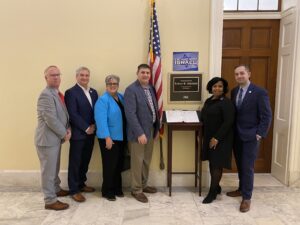TARCOG pushes for more federal funding

Board President Connie Spears, Executive Director Michelle Jordan and Economic Development and Planning Director Lee Terry met with U.S. Congressman Robert Aderholt in March to talk about legislation that would provide additional funding for economic growth in the TARCOG region.
During a meeting of the National Association of Development Organizations and the Development District Association of Appalachia held in Washington, D.C., Michelle and Lee participated in sessions focused on regional development, the federal landscape, and the programs and policies that matter most to regional development organizations like TARCOG and its stakeholders.
Alabama Councils Reach Out
While in the nation’s capital Michelle and Lee, along with representatives from the Northwest Alabama Council of Local Governments and West Alabama Regional Commission scheduled a meeting with Aderholt. During their time with Aderholt and his staff, Michelle and Lee encouraged the passage of the Economic Development Reauthorization Act of 2024 (S. 3891). Lee said it is a bipartisan bill which, if passed, would modernize and update crucial elements of EDA’s statute and its investments for the first time in 20 years.
There are more than 400 Economic Development Districts (EDDs) like TARCOG in the U.S., and each one receives an annual appropriation from EDA. That’s barely enough to cover one full time staff person. Most EDDs, like TARCOG, cover numerous counties, cities and towns, so one staff person covering such a large territory is already stretched thin.
The funding supports an EDD helping:
- Stakeholders and organizations apply for EDA grants.
- Administer EDA project funding and assist with project implementation.
- EDA grantees properly administer and steward the EDQ funding they receive.
- Lead and leverage local partnerships and help identify local projects that are eligible for EDA funding.
- Develop Comprehensive Economic Development Strategy, provide local planning expertise, which lays the foundation for successful project implementation.
“It’s been on the back burner for 20 years,” Lee said. “The issue with that is the funding for the Economic Development Administration has been basically at the same level from 20 years ago. With inflation along with all the infrastructure work that needs to be done, the funding hasn’t kept pace.”
He said if approved, the new authorization would increase the funding level from about $34.5 million in 2023 to $90 million in 2024, escalating to $130 million by Fiscal Year 2029.
Lee said this change would go a long way to get needed services into communities around the nation.
“By increasing the funding level, it would increase the amount of work we can do for our community partners at no or very little cost,” Lee said.